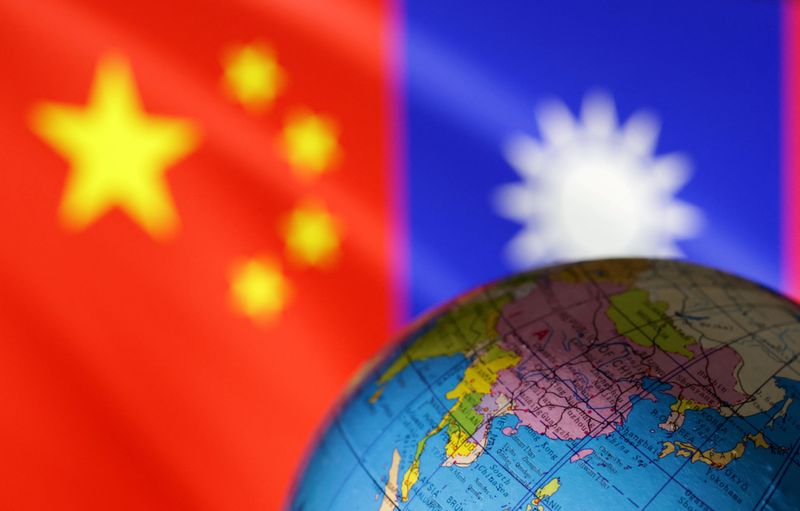By Ben Blanchard and Yimou Lee
TAIPEI (Reuters) - Chinese President Xi Jinping asked U.S. President Joe Biden last year to toughen the language the United States uses when discussing its position on Taiwanese independence, according to two U.S. officials familiar with the private conversation.
Below are some questions and answers about what is meant by the term "Taiwan independence":
WHAT IS TAIWAN'S HISTORY AND FORMAL NAME TODAY?
Formerly known as Formosa, the island has been home to indigenous people for thousands of years, before the Dutch and Spanish briefly ruled parts of it in the 1600s.
The Qing dynasty incorporated Taiwan as part of Fujian province in 1684 and only declared it a separate Chinese province in 1885.
Following the Qing's defeat in a war with Japan, it became a Japanese colony in 1895. In 1945, it was handed over to the Republic of China government at the end of World War Two.
In 1949 after being defeated by Mao Zedong's communist forces, the defeated Republic of China government fled to Taiwan, and Republic of China remains the island's formal name. Mao set up the People's Republic of China, and claimed it was the only legitimate Chinese government for the whole country, including Taiwan, as the successor state to the Republic of China.
WHAT IS TAIWAN'S INTERNATIONAL STATUS?
For decades, the Republic of China in Taipei also claimed to be the legitimate Chinese government, but in 1971 it was expelled from the United Nations in favour of the Beijing government. Currently only 12 countries maintain formal ties with Taipei, mostly small and poorer developing nations such as Belize and Tuvalu.
Most major Western countries and U.S. allies maintain close unofficial ties with Taiwan by recognising the Republic of China passport and having de facto embassies in each other's capitals.
The United States severed official ties with Taipei in 1979 but is bound by law to provide the island with the means to defend itself. The United States officially takes no position on Taiwan's sovereignty under Washington's "One China" policy.
China says it will not renounce the use of force to bring Taiwan under its control. Beijing has offered Taiwan a "one country, two systems" model similar to Hong Kong, though no major political party in Taiwan supports that.
IS TAIWAN ALREADY AN INDEPENDENT COUNTRY?
Taiwan, whose people elect their own leaders and whose government controls a defined area of territory with its own military and passport, enjoys de facto independence even if that is not formally recognised by most countries.
Taiwan's government says the Republic of China is a sovereign state and that Beijing has no right to speak for or represent it given the People's Republic of China has no say in how it chooses its leaders and has never ruled Taiwan.
COULD TAIPEI DECLARE A "REPUBLIC OF TAIWAN"?
It would be very difficult and require first parliament approves a constitutional amendment and then a referendum, rather than a simple declaration by President Lai Ching-te.
At least 75% of lawmakers would need to pass that amendment, and the ruling Democratic Progressive Party (DPP) and main opposition party the Kuomintang (KMT) currently have an equal number of seats.
The DPP, which has been in power since 2016, has not made an attempt to change the constitution. The KMT strongly opposes any attempts to change the name of Republic of China.
WHAT DOES TAIWAN'S PRESIDENT SAY ABOUT INDEPENDENCE?
China strongly detests Lai and calls him a "separatist". Before Lai was elected president he made comments about being a "practical worker for Taiwan independence". Lai maintains he simply meant Taiwan is already an independent country.
Since taking office Lai has said on several occasions that the Republic of China and People's Republic of China are "not subordinate to each other", which Beijing says means he believes the two are separate countries and so he is therefore pushing an independence narrative.
Lai says he is simply stating a fact and that in any case the Republic of China, founded after the overthrow of the last imperial dynasty in 1911, is an older state than the People's Republic of China which was only established in 1949.
DOES CHINA HAVE A LEGAL FRAMEWORK TO PREVENT FORMAL INDEPENDENCE?
In 2005, China's largely rubber-stamp parliament passed the Anti-Secession Law that gives the country the legal basis for military action against Taiwan if it secedes or seems about to, but the law is vague and does not give details.
There has been speculation in Taipei that China might use next year's 20th anniversary of the law to offer greater clarity. China has not confirmed that.

In 2022, Chinese state media raised the possibility of a "reunification law" to give Beijing a further legal framework to bring Taiwan under its control but there has been no further movement towards that to date.
(This story has been refiled to correct the spelling of 'China' in paragraph 16)